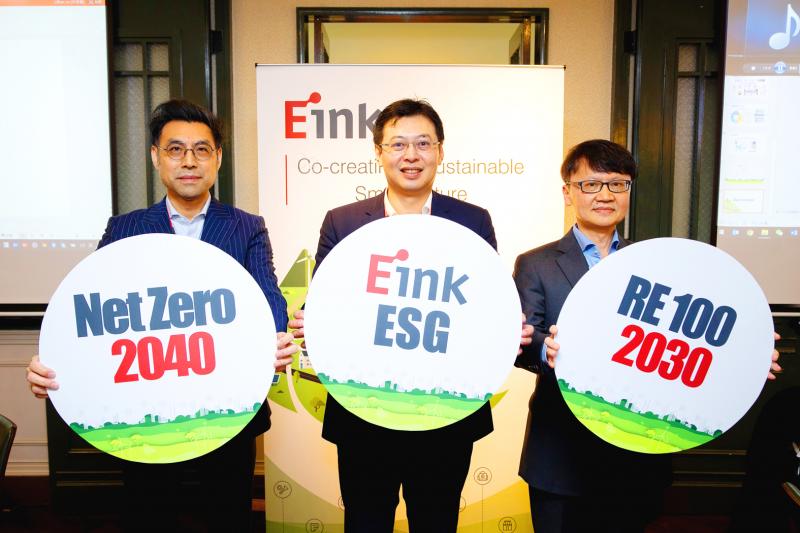Shares of E Ink Holdings Inc (元太科技) yesterday surged 3.86 percent after the world’s sole e-paper display maker said that some of its customers are willing to pay deposits to secure supply.
E Ink shares yesterday closed at NT$148. Since the beginning of this year, the price has more than tripled from NT$48.5.
The Hsinchu-based company said it is racing to expand capacity, but is still unable to catch up with demand.

Photo courtesy of E Ink Holdings Inc
The company has budgeted NT$2 billion (US$72.1 million) for capital expenditure this year and plans to expand its capital investment to between NT$3 billion and NT$4 billion next year.
“Demand is quite strong, while supply is currently tight,” E Ink chairman Johnson Lee (李政昊) said on Thursday. “It is a challenge to fully satisfy demand. Our capacity has been fully booked for the whole year of next year.”
However, E Ink is cautious about the fallout of the US Federal Reserve’s plan to increase its benchmark interest rates next year and mounting inflation concerns, as those factors could dampen private consumption and undermine demand for electronic products, Lee said.
E Ink plans to build four new production lines, with the first to begin operations by the end of this year, and two more to start production next year.
That would more than double the company’s capacity from the start of this year.
The fourth line is expected to begin production in 2023, the company said.
E Ink attributed the growth momentum to replacement demand for color e-readers and emerging demand for e-notes, which are designed to replace paper notebooks and printed documents as the company’s next-generation color display technology, Kaleido plus, gains traction.
E Ink has added Norwegian e-note vendor reMarkable AS to its client list.
Demand for store shelf labels also soared as more US hypermarket operators and retailers such as Best Buy Co Inc, Walmart Inc and The Home Depot Inc joined their European peers in replacing paper labels with electronic ones.
The COVID-19 pandemic helped boost demand for e-paper displays used as shelf labels as major retailers looked to benefit from the operational efficiency they provide especially when labor became scarce due to pandemic-related restrictions, E Ink president F.Y. Gan (甘豐源) said.
It takes only three hours for hypermarkets with 2,000 outlets to adjust their prices using the labels, compared with two weeks previously, Gan said.
By the end of this year, E Ink expects the number of e-paper displays used in shelf labels to reach 400 million since they first hit the market in 2012, Gan said.
About 60 percent of the shipments would be to the European market, he said.
To better service its customers in Europe, E Ink is planning to establish a new team in the Netherlands probably in 2023 and could expand the unit into a branch office in the longer term, he said.
That would complete E Ink’s global deployment, since it would operate either a branch office or manufacturing facility in Taiwan, China, the US and Europe, he added.
The new European team would be also be helpful in addressing the carbon border tax on imports from non-EU manufacturers, which is expected to take effect in 2026, the company said.

Real estate agent and property developer JSL Construction & Development Co (愛山林) led the average compensation rankings among companies listed on the Taiwan Stock Exchange (TWSE) last year, while contract chipmaker Taiwan Semiconductor Manufacturing Co (TSMC, 台積電) finished 14th. JSL Construction paid its employees total average compensation of NT$4.78 million (US$159,701), down 13.5 percent from a year earlier, but still ahead of the most profitable listed tech giants, including TSMC, TWSE data showed. Last year, the average compensation (which includes salary, overtime, bonuses and allowances) paid by TSMC rose 21.6 percent to reach about NT$3.33 million, lifting its ranking by 10 notches

SEASONAL WEAKNESS: The combined revenue of the top 10 foundries fell 5.4%, but rush orders and China’s subsidies partially offset slowing demand Taiwan Semiconductor Manufacturing Co (TSMC, 台積電) further solidified its dominance in the global wafer foundry business in the first quarter of this year, remaining far ahead of its closest rival, Samsung Electronics Co, TrendForce Corp (集邦科技) said yesterday. TSMC posted US$25.52 billion in sales in the January-to-March period, down 5 percent from the previous quarter, but its market share rose from 67.1 percent the previous quarter to 67.6 percent, TrendForce said in a report. While smartphone-related wafer shipments declined in the first quarter due to seasonal factors, solid demand for artificial intelligence (AI) and high-performance computing (HPC) devices and urgent TV-related orders

Prices of gasoline and diesel products at domestic fuel stations are this week to rise NT$0.2 and NT$0.3 per liter respectively, after international crude oil prices increased last week, CPC Corp, Taiwan (台灣中油) and Formosa Petrochemical Corp (台塑石化) said yesterday. International crude oil prices last week snapped a two-week losing streak as the geopolitical situation between Russia and Ukraine turned increasingly tense, CPC said in a statement. News that some oil production facilities in Alberta, Canada, were shut down due to wildfires and that US-Iran nuclear talks made no progress also helped push oil prices to a significant weekly gain, Formosa said

MINERAL DIPLOMACY: The Chinese commerce ministry said it approved applications for the export of rare earths in a move that could help ease US-China trade tensions Chinese Vice Premier He Lifeng (何立峰) is today to meet a US delegation for talks in the UK, Beijing announced on Saturday amid a fragile truce in the trade dispute between the two powers. He is to visit the UK from yesterday to Friday at the invitation of the British government, the Chinese Ministry of Foreign Affairs said in a statement. He and US representatives are to cochair the first meeting of the US-China economic and trade consultation mechanism, it said. US President Donald Trump on Friday announced that a new round of trade talks with China would start in London beginning today,